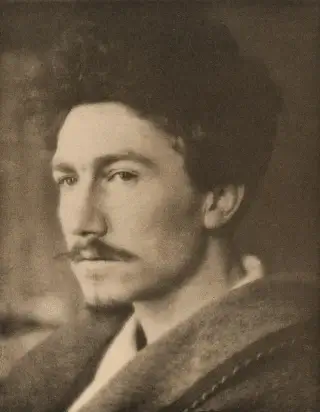Biography of Ezra Pound

| date | place | |
|---|---|---|
| born | October 30, 1885 | Hailey, Idaho, U.S |
| died | November 01, 1972 | Venice, Italy |
Ezra Pound, born on October 30, 1885, in Hailey, Idaho, was a seminal figure in American poetry and a leading voice of the Modernist movement. The only child of Homer Loomis Pound, a Federal Land Office official, and Isabel Weston Pound, he spent much of his childhood in Pennsylvania after his family moved there when he was young. His early education at Cheltenham Military Academy and later at the University of Pennsylvania laid the foundation for his literary career. Pound's personal life was marked by significant relationships that influenced his work. He became engaged to Hilda Doolittle (H.D.), a fellow poet, during his time at the University of Pennsylvania, but the engagement ended, leading him to marry Dorothy Shakespear in 1909. Dorothy, an artist and writer, played a crucial role in his life, introducing him to prominent literary figures such as W.B. Yeats and George Bernard Shaw. The couple had two children: a daughter named Maria with violinist Olga Rudge in 1925, and a son named Omar with Dorothy in 1926. Despite his marriage, Pound maintained an open affair with Rudge, reflecting the complexities of his personal relationships. Pound's literary career began early; he published his first poem at age eleven and self-published his first book, "A Lume Spento", in 1908. He became a central figure in the "Imagist movement", which emphasized precision and clarity in poetry. His work as an editor for various literary magazines helped foster the careers of many contemporaries, including T.S. Eliot and James Joyce. He was instrumental in promoting modernist aesthetics and sought to redefine poetry through innovative techniques. Throughout the 1910s and 1920s, Pound lived in Europe, immersing himself in the vibrant literary scenes of London and Paris. He became known for his critical essays and for editing major works like Eliot's "The Waste Land". His life took a controversial turn during World War II when he began broadcasting pro-Fascist propaganda from Italy. His political views led to his arrest for treason in 1945 after the war ended. Following his arrest, Pound was held in a detention camp before being committed to St. Elizabeths Hospital in Washington, D.C., where he spent over a decade due to mental health issues. During this time, he continued to write prolifically and produced some of his most significant works, including "The Pisan Cantos", which earned him the Bollingen Prize for Poetry in 1949. In 1958, after extensive campaigns by fellow writers advocating for his release, Pound was discharged from the hospital. He returned to Italy and lived as a semi-recluse until his death on November 1, 1972, in Venice. Despite the controversies surrounding his political beliefs and actions during World War II, Pound's contributions to modern poetry remain influential. His legacy is characterized by both his innovative poetic techniques and the complex interplay between his art and personal ideologies. Ezra Pound's poetry is a defining element of Modernist literature, particularly through his role as a pioneer of the "Imagist movement". His poems are characterized by their emphasis on vivid imagery and precise language, aiming to present a direct treatment of the subject matter without unnecessary embellishments. One of the most famous examples of his Imagist style is "In a Station of the Metro," where he captures the fleeting beauty of urban life in just 14 words: "The apparition of these faces in the crowd: / Petals on a wet, black bough." This poem illustrates Pound's principle that every word must serve a purpose, reflecting his belief that poetry should evoke strong images and emotions while remaining concise and impactful. Through such works, Pound sought to strip poetry down to its essence, allowing readers to experience the world through clear, concrete images. Beyond Imagism, Pound's broader body of work includes his monumental "Cantos", an epic series that spans over 800 pages and incorporates multiple languages and cultural references. The "Cantos" reflect his complex views on history, politics, and art, often weaving together disparate elements into a cohesive narrative that challenges conventional poetic forms. Despite their seemingly chaotic structure, close analysis reveals Pound's meticulous craftsmanship and thematic coherence. His innovative use of rhythm and sound further enhances the emotional depth of his poetry, as he believed that the musicality of language was essential to its effectiveness. Overall, Ezra Pound's poems not only transformed the landscape of American poetry but also established him as a crucial figure in the evolution of modern literature.
Feel free to be first to leave comment.